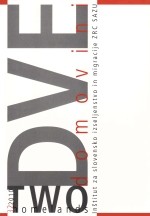Children and Childhood in Migration Contexts
Keywords:
the positioning of children in migration contexts, Slovenian emigration, stigmatization of children migrantsAbstract
A presentation of the difficulties of defining the childhood and children in cultural and historical studies is followed by a presentation of the different forms of positioning children in the migration process and the making of decisions about them. Each form is illustrated with examples from research projects, based on auto/biographical sources and narrative descriptions of subjective migration experience. The conclusion argues that migration researchers take into account the subjectivity of the “objects” of their research projects and humanize the migrants, especially their children. In this way, the text combines the children in the historical context of Slovenian emigration with the children in the context of immigration to Slovenia today in a united story.
Downloads
References
Ariès, Phillipe (1962). Centuries of Childhood, A Social History of Family Life. New York: Vintage Books.
Barbič, Ana, Miklavčič-Brezigar Inga (1999). Domestic Work Abroad: a necessity and an opportunity for rural women from the Goriska borderland region of Slovenia. Gender, Migration and Domestic Service. (ed.) Momsen, J.H. . London: Routledge, 164–178.
Baskar, Bojan (1991). ‘Nedeljski zgodovinar’ in ‘desni anarhist’ Philippe Ariès (Spremna beseda). Phillipe Aries, Otrok in družinsko življenje v starem režimu. Ljubljana: ŠKUC, Filozofska fakulteta, 501–523.
Douek, Ellis (2004). A Middle Eastern Affair. London: Peter Halban Publishers Ltd.
Koprivec, Daša (2006). Aleksandrinkas – življenje v Egiptu in doma. Etnolog 16: 97–115.
Koprivec, Daša (2008). Egiptovski otroci in njihove varuške aleksandrinkas. Etnolog 18: 167–186.
Lukšič-Hacin, Marina (ured.) (2006). Spet doma? Povratne migracije med politiko, prakso in teorijo. Ljubljana: Založba ZRC SAZU.
Milharčič Hladnik, Mirjam (2003). Slovenian women’s stories from America. Dve domovini / Two Homelands 17: 47–60.
Milharčič Hladnik, Mirjam (2007). Marie Prisland - her role in preserving Slovenian culture and tradition among Slovenian migrants in the United States. Dve domovini / Two Homelands 25: 229–247.
Milharčič Hladnik, Mirjam (2008). Internet in preobrazbe ohranjanja kulturne dediščine v slovenskoameriških etničnih skupnostih, Dve domovini / Two Homelands 28, 57–72.
Parrenas, Salazar Rachel (2002). The Care Crisis in the Philippines: Children and Transnational Families in the New Global Economy. Global Woman: Nannies, Maids and Sex Workersin the New Economy (ed. Barbara Ehrenreich and Arlie Russell Hochschild). New York: Metropolitan Books, Henry Holt and Company, 39–54.
Prisland, Marie (1968). From Slovenia to America, Recollections and Collections. Chicago: Slovenian Women’s Union of America.
Puhar, Alenka (1982). Prvotno besedilo življenja, Oriszgodovine otroštva na Slovenskem v 19. stoletju. Zagreb: Globus.
Tomšič, Marjan (2002). Grenko morje. Ljubljana: Založba Kmečki glas.
Škrlj, Katja (2009). Komaj sem čakala, da zrastem in postanem aleksandrinka, demitizacija aleksandrink. Krila migracij, Po meri življenjskih zgodb. (ed. Mirjam Milharčič Hladnik and Jernej Mlekuž). Ljubljana: Založba ZRC SAZU, 143–189.
UNICEF (2009). Children in Immigrant Familiesin Eight AffluentCountries, Their Family, National and International Context. Florence: Unicef Innocenti Research Centre.
WHO (2006). Investing in Our Future: Framework for Accelerating Action forthe Sexual and Reproductive Health of Young People. Dostopno na: http://whqlibdoc.who.int/ publications/2010/9789241599528_eng.pdf (20. avgust 2010).
Žitnik, Janja (2008) Statistical facts are human fates: Unequal citizens in Slovenia. Journal of Ethnic and Migration Studies, 34(1): 77–94.
Žitnik Serafin, Janja (2009). Pisatelj med dvema domovinama: Louis Adamič in vprašanja nacionalne, etnične in kulturne identitete. Dve domovini / Two Homelands 30: 115–132.
Downloads
Published
How to Cite
Issue
Section
License

This work is licensed under a Creative Commons Attribution-NonCommercial-NoDerivatives 4.0 International License.
Authors guarantee that the work is their own original creation and does not infringe any statutory or common-law copyright or any proprietary right of any third party. In case of claims by third parties, authors commit their self to defend the interests of the publisher, and shall cover any potential costs.
More in: Submission chapter





